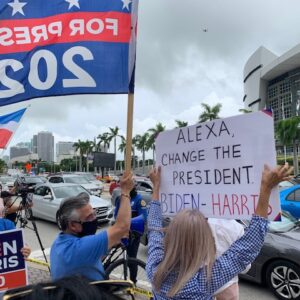Nearly one month ago, activists gathered on Biscayne Boulevard in Downtown Miami as President Trump took part in a televised town hall at the Pérez Art Museum. His supporters stood on one side, and Biden’s on the other, separated by a row of mounted police as they chanted and insulted each other. The mood was tense.

On Saturday, along the same street, Biden’s supporters celebrated his much-delayed victory in the 2020 presidential election, with a number of media outlets having projected him as the winner in Pennsylvania late that morning, which put him over the decisive threshold of 270 electoral votes. Hundreds of people gathered in front of the Kislak Center on Biscayne Boulevard, blowing airhorns and banging pots, dancing to music on loudspeakers. A great number of the passing motorists requited them by honking their horns and revving their engines.
There was a large Latino contingent in support, as many Venezuelan and Cuban flags flew alongside those from the Biden campaign and the stars-and-stripes. Miami-Dade County was one of the nuclei of support for the Biden campaign in Florida, and from the strong show of support there, one might not even have guessed that he had lost the state, or that the Trump campaign made inroads in the Latino community overall, here and elsewhere.

“[Trump] won [the state] through disinformation,” said Marco Frieri, a local political activist. Marco is of Colombian origin, a ten-year resident of Miami, Vice President of the Downtown Democrats and leader of Colombians With Biden. “There’s a message that actually emigrated from Latin America, the famous ‘castrochavismo,’ that anybody that’s liberal, center-left, supports communism or socialism.” The broadcasting of that message had been clear at Mike Pence’s rally in front of Memorial Cubano just a few weeks ago. Nearly every guest speaker at that event had related stories of socialist Venezuela and Communist Cuba, linking their personal hardships with Biden and Harris’ supposed plans. Marco was disappointed with the effectiveness of that narrative: “That’s a lie. The democratic party is not socialist, in that sense. We provide for the working class, the immigrants, and minorities, policies that favor them as well.”
This narrative had also been spread effectively beyond in-person events. “Latinos, we use a lot of WhatsApp groups – to go to soccer games, for whatever, for family events,” said Chris, who originally hails from Venezuela. “They penetrated these groups and they started floating propaganda, and so people share memes. And I think the reason why Biden couldn’t, is because Americans don’t really use WhatsApp, that’s a very Latin thing.”
WhatsApp’s power has indeed been documented in the 2018 Presidential election in Brazil, where Jair Bolsonaro found it an effective conduit for political communication during his successful campaign. Chris said that what he saw on that platform played up fears about Biden’s running mate: “what they were saying is that Biden’s an idiot, he’s not gonna govern. It’s gonna be Kamala – who you don’t know, has a funny name – and she’s a communist. If I’m from Cuba, I don’t speak English, everyone that I know has also fallen victim to the same propaganda… Sure, you can blame me for being misinformed, but I don’t. I understand what happened.”

The Biden campaign’s messaging failure begged the question as to what the strategy would be in future races. “Political campaigns need a narrative: there’s a hero and a villain,” said Tomás Kennedy, Florida director of the United We Dream PAC, which supported Biden’s candidacy in Florida as well as numerous down-ballot candidates, including the new mayor-elect of Miami, Daniella Levine Cava. He saw potential in President Obama’s re-election strategy: “the 2012 campaign managed to paint Mitt Romney as a villain to working class people, […] talking about how Mitt Romney said corporations are people, about how he would buy companies and then liquidate them for profit […] so we really need to get back to those narratives, and paint a clear message of why this corrupt corporatism is hurting working class people, the everyday regular person.”

The relief people expressed for Biden’s successful campaign overall was deeply personal at times. Ralph, a Biden supporter I met at a polling place a couple of weeks ago in Miami Lakes was also there. He recognized me and we caught up. He reiterated the importance of this outcome for his personal health in the face of COVID-19, and what that meant for his husband and children’s security. His spouse was with him, and both were dressed as superheroes.
Others were reassured by the expected leftward shift on immigration policy. “I’m a DACA recipient,” said Julia, a Miami resident originally from Guatemala. “Trump being in office is the scariest experience of my life. My life completely changed thanks to DACA that Obama implemented. I was able to go to college, get a driver’s license and get a full-time job. I’m really excited to feel like my future is back.”











